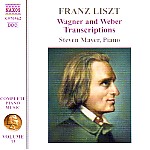Aside from the clunky tempo during the central bacchanal in the Tannhäuser Overture, and the odd, backward accentuation of the descending violin figures in the opening chorale, Steven Mayer has an irritating habit of inserting little pauses every couple of bars just when the music needs to surge forward. You can hear it in this piece, and also at the fortissimo outburst in the allegro of the Freischütz Overture, breaking the music up into two-bar fragments. Assuming that Mayer has the chops to get his hands in place in time, this “artistic” effect is something that anyone who knows the orchestral originals (just about all of us) will naturally loathe as completely unnecessary and mannered.
The remainder of the program is more lyrical, markedly less grandiose, and accordingly goes better. Walhall (Valhalla) isn’t one of Liszt’s better arrangements (it’s not Wagner’s best moment either), but Mayer sustains it well. The two other items from Tannhäuser, along with Am stillen Herd (from Meistersinger), fall pleasantly on the ear. Clearly Mayer has no problem in projecting the music’s cantabile lines, and Liszt’s piano writing (in the Tannhäuser Overture especially) skirts the boundaries of the possible; but the want of bravura certainly dampens my enthusiasm for this otherwise intelligently programmed release.
































